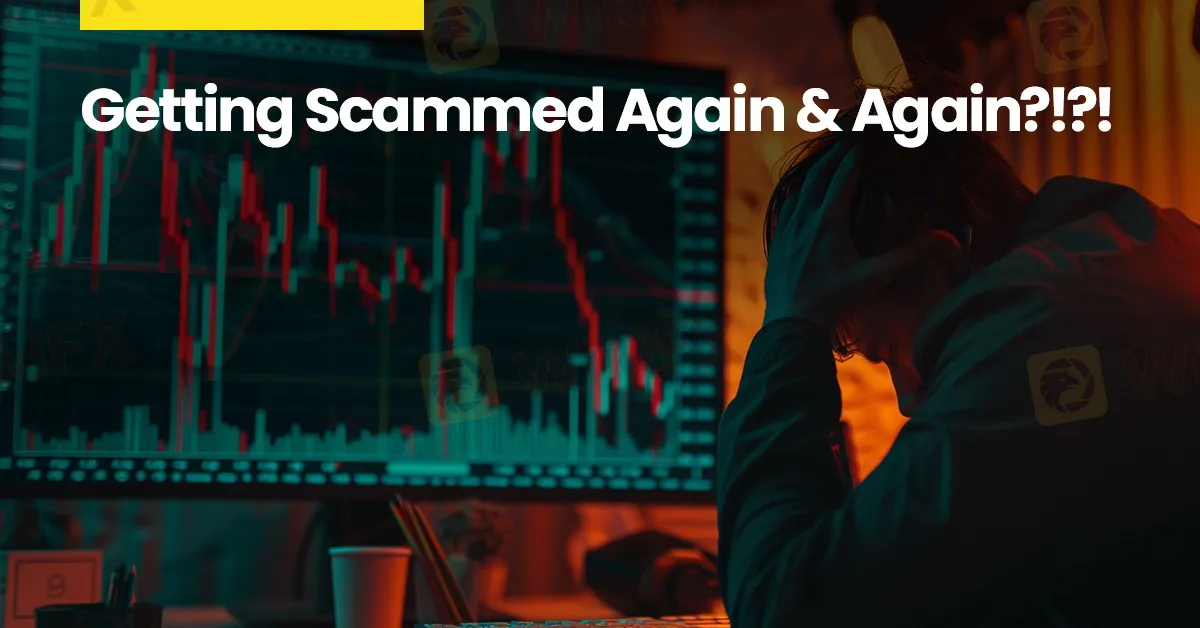简体中文
繁體中文
English
Pусский
日本語
ภาษาไทย
Tiếng Việt
Bahasa Indonesia
Español
हिन्दी
Filippiiniläinen
Français
Deutsch
Português
Türkçe
한국어
العربية
Getting Scammed Again & Again?!?!
Abstract:In the fast-paced world of forex and cryptocurrency trading, the allure of quick profits can sometimes overshadow caution, leading many traders into the same traps repeatedly. In this article, we will be addressing the issue of why some people tend to be vulnerable to scams within this industry.

In the fast-paced world of forex and cryptocurrency trading, the allure of quick profits can sometimes overshadow caution, leading many traders into the same traps repeatedly. Understanding the psychological appeal of these scams, the mental factors influencing susceptibility, and the behavioural patterns that contribute to scam vulnerability is essential to breaking this cycle.
The Psychological Appeal of Scams
At the core of many scams is a fundamental psychological appeal: the promise of substantial gains with minimal effort. Scammers craft their messages to exploit our innate desires for wealth and success, often tapping into emotions like greed, fear, and urgency. The idea of making quick money without the typical hard work and risk involved in legitimate trading can be incredibly enticing.
For instance, the fear of missing out (FOMO) is a powerful motivator. Scammers often create a sense of urgency, convincing potential victims that they must act quickly to capitalize on a unique opportunity. This rush to decision-making can cloud judgment and lead individuals to overlook red flags that they might otherwise recognize.
Mental Factors and Diseases Influencing Susceptibility
Several mental factors can increase a person's vulnerability to scams. Cognitive biases, such as overconfidence and confirmation bias, can play significant roles. Overconfidence leads individuals to believe they are less likely to be scammed than others, while confirmation bias drives them to seek out information that supports their pre-existing beliefs, ignoring warning signs.
Moreover, certain mental health conditions can also make individuals more susceptible. People suffering from depression, anxiety, or loneliness may be more prone to fall for scams as they seek out hope or companionship. The emotional rollercoaster of trading can exacerbate these conditions, making the promises of scammers seem even more appealing as a quick fix to their emotional distress.

Behavioural Patterns Contributing to Scam Vulnerability
Behavioural patterns, especially those formed over time, can significantly contribute to one's susceptibility to scams. One common pattern is the lack of due diligence. Many traders, especially those new to the online trading industry, fail to conduct thorough research before investing. They might take information at face value without verifying the credibility of the source or the feasibility of the promised returns.
Another contributing factor is the tendency to follow the crowd. Social proof, where people look to others to determine their actions, can lead traders into scams that seem popular or widely accepted. Scammers often fabricate testimonials and success stories to create an illusion of legitimacy and widespread approval, making it difficult for individuals to discern the truth.
Additionally, the repetitive nature of falling for scams can create a cycle of learned helplessness. After being scammed multiple times, individuals might start to believe that avoiding scams is beyond their control. This defeatist attitude can reduce their motivation to take preventative measures, making them even more vulnerable to future scams.
Breaking the Cycle
Breaking free from the cycle of scams requires a multifaceted approach. Education and awareness are crucial; understanding the common tactics used by scammers can help individuals recognize and avoid potential traps. Building a community of trustworthy peers can also provide support and a second opinion before making significant investment decisions.
Moreover, addressing the underlying psychological and emotional factors is essential. This might involve seeking professional help for mental health issues or developing healthier coping mechanisms for stress and anxiety related to trading.
In conclusion, repeatedly falling for scams in the forex and cryptocurrency markets is often the result of a complex interplay of psychological appeal, mental factors, and behavioural patterns. By understanding these elements and taking proactive steps to address them, traders can protect themselves and make more informed, cautious decisions in their financial ventures.

Disclaimer:
The views in this article only represent the author's personal views, and do not constitute investment advice on this platform. This platform does not guarantee the accuracy, completeness and timeliness of the information in the article, and will not be liable for any loss caused by the use of or reliance on the information in the article.
Read more

CLS Global Admits to Crypto Fraud
CLS Global, a cryptocurrency financial services firm based in the United Arab Emirates, pleaded guilty to fraud-related charges.

Why Germany’s Economy and Stock Market Tell Two Different Stories
Germany's economic growth has continued to be sluggish, yet its stock market has remained exceptionally strong, sparking widespread attention. Why do we see a coexistence of economic stagnation and stock market prosperity? In this article, we will delve into the reasons behind this phenomenon and possible strategies for addressing it.

Breaking News: Indian Firm Defrauds UAE Businesses of ₹29 Crore Trade Scam
Indian firm defrauds UAE businesses in a ₹29 crore trade scam. Details on victims, modus operandi, and police investigations.

Vantage Markets Extends Deposit Bonus to Boost Copy Trading
Vantage Markets extends Deposit Bonus for Copy Trading Accounts lets you trade smarter. Enjoy bonus capital, profit-sharing, and intuitive trading tools today!
WikiFX Broker
Latest News
IG Japan Extends US Stock CFD Trading Hours in 2025
ALERT! Warning against Livaxxen
Which Zodiac Sign Makes the Best Trader?
Plus500 Collaborates with Topstep, Prop firm
Will Gold Prices Continue to Rise Due to Trump’s Tariffs?
Miami Firm Owner Pleads Guilty to $6M Ponzi Scheme Fraud
NBI Cebu Arrests Forex Trader for Illegal Investment Solicitation
PU Prime's "Feather Your Trades" Contest! Begin
eToro Files for IPO with $5 Billion Valuation on NASDAQ
Is FizmoFX a Scam? Fraud and Account Suspension of Traders
Currency Calculator


